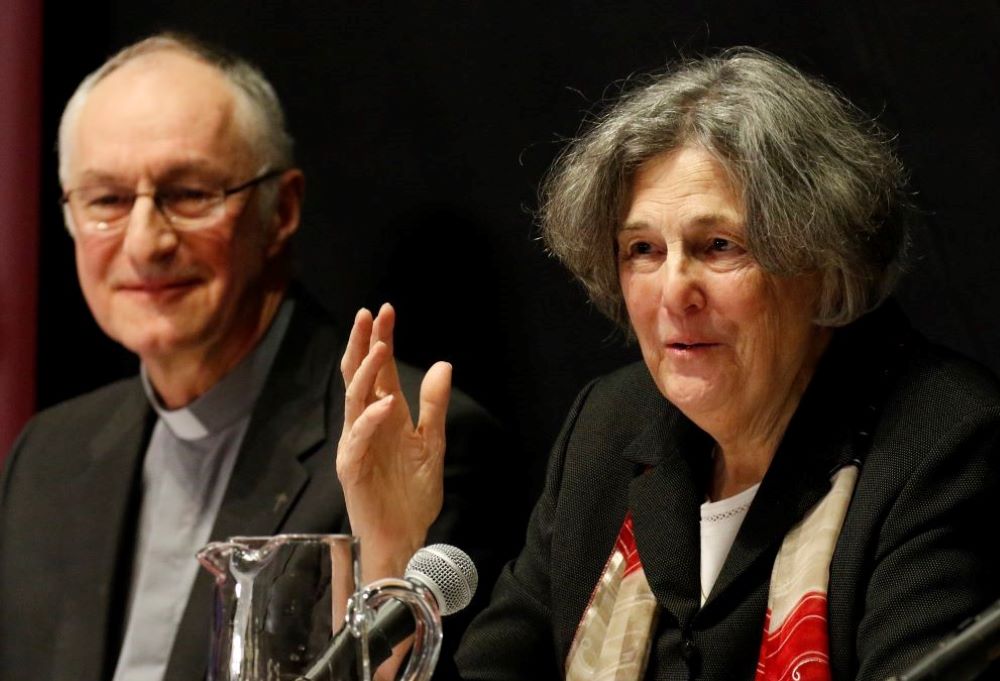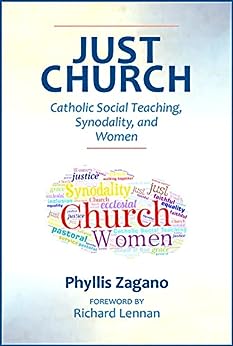
Phyllis Zagano speaks during a 2019 symposium on the history and future of women deacons at Fordham University. Looking on is Jesuit Fr. Bernard Pottier, a member of the Vatican's International Theological Commission. Zagano's latest book is Just Church: Catholic Social Teaching, Synodality, and Women. (CNS/Gregory A. Shemitz)
I find myself having a hard time keeping up with the Roman Catholic Church these days. As a Catholic theological ethicist with a feminist bent, no one is more surprised by this development than me. Well, except maybe for Phyllis Zagano.
Zagano has spent much of her theological vocation making the biblical, historical and even canonical case for a resounding theme arising out of the global synodal process on Communion, Participation and Mission: women's full participation in the life of the church. And yet, as I read her latest book, Just Church: Catholic Social Teaching, Synodality, and Women. I found myself wondering if even Zagano — a Vatican insider on most things related to women in the diaconate in light of her service on the first of Pope Francis' two theological commissions on the subject — could imagine the dramatic changes in our current ecclesial reality since the book's release earlier this year.

We are just weeks away from the XVI General Ordinary Assembly of the Synod of Bishops in which, for the first time in the church's history, more than 50 women will have the same voting status as their brother bishops on matters central to the church's self-understanding in the new millennium.
Despite the astonishment (or suspicion, or even reproach) over Pope Francis' decisions to pull women and our concerns from the periphery into the center of the church in this synodal journey, Just Church demonstrates that these are not in fact out-of-left-field developments. Zagano's concise overview of three sprawling topics — the church's social tradition on justice, the ancient and yet re-emerging methodology of synodality and the modern history of women in ecclesial ministry — through the lens of women's lived experience in the church simultaneously helps us understand how ordinary this turn of events ought to be and just how extraordinary an opportunity for rethinking women's participation in the church it really is. She also equips all of us to be active participants in synodal discernments about — and including — women that will unfold in Rome in October.
In some ways, this accessible text reads like three "state of the question" summaries, akin to Paulist Press' incredibly useful What are They Saying About series: what are they saying about women in Catholic social teaching, about women in modern synods (including this synod) and about women's leadership and ordination, two particularly thorny issues that will surely flex the communal discernment muscles in the current synod. As such, it could serve as a quick study of the delegates to the general assembly or those who seek to engage it from our local contexts.
And while she is reluctant to identify herself as a feminist theologian, Zagano pulls no punches here employing a feminist hermeneutic in answering the question she poses at the outset of the book: "how can the church be just?" We can start with an ad intra application of Catholic social teaching by lifting up the lived experience of women (Chapter 1) both within and beyond the church. We can pay attention to the protagonism of women unleashed in the synods of Pope Francis' papacy (Chapter 2). Finally, we can examine historical precedents and current developments around "lay-clerical tensions" in ecclesial governance and jurisprudence (Chapter 3).
"The hopes of women in the Church, however, cannot depend on one man. Popes come and go ... circular arguments continue."
→Phyllis Zagano
In her trademark no-nonsense style, Zagano mines the Catholic tradition for the insights that arise when we enter more fully into tensions and contradictions of our current reality — most notably the contradiction of women's simultaneous peripheral status within the church despite the fact that we are its very center through our disproportionate presence in the pews and labor in serving its mission. Most important for me, as an emerging community organizer in the church, was Zagano's "power mapping" of clericalism — e.g., its canonical sources, who is exercising it and how, Pope Francis' own evolving sense of it and women's motivations for interrupting it.
The text is not simply informative, it is formative.
I did find myself looking for more embodied, personal or narrative connective tissue among the three sections. Zagano's analysis of where we are and where we could be headed as a global church would have been strengthened by including the experience of a particular group of women or the witness of individuals who illuminate the power of our collective stories in unleashing the kind of moral agency we'll need to break the logjam of clericalism. For example, Zagano could have amplified some of her central claims by demonstrating ways that women themselves have advanced or amplified the tradition of Catholic social teaching or a bit more of the stories of the women who have joined the curia since Pope Francis launched his reform of it in Praedicate Evangelium in March 2022.
That said, the teacher in me will certainly use Just Church in my ethics and feminist theology courses, given how clearly and succinctly Zagano presents the fundamentals of Catholic social teaching and its implications for the feminization of all kinds of injustices, including ecclesial ones. And her chapter on synodality is a primer for all of us who are struggling to understand that "synod" is not some newfangled, jargony way of doing the same old thing but actually an ancient method of ecclesial self-reflection that can spark change through structural reform that animates from individual and collective conversations in the Spirit. It has already been an asset to me in evangelizing about the synod with fellow Catholics, particularly women who are understandably cynical when it comes to the church's capacity for change.
Advertisement
Again, I marvel to think that Zagano set this timely table for us only months before she and the rest of us learned that women will be included as voting delegates in the general assembly and before all Catholics were invited to engage with the 15 worksheets of the Instrumentum Laboris for the general assembly, designed to prompt us to pay attention to the Spirit's call to more inclusive communion, broader participation and a mission that sends us out to the peripheries.
As we wait with great anticipation what may unfold in Rome, Zagano's warning haunts me a bit: "The hopes of women in the Church, however, cannot depend on one man. Popes come and go ... circular arguments continue." Equipped with the historical perspective and power mapping she provides and buoyed by the contributions that more than 50 of our sisters will undoubtedly make by virtue of the Holy Spirit working in and through them this October, I am hopeful that the rest of us will be ready to see ourselves, and not only hierarchical leadership, in Zagano's prognostication: "How can the synod on synodality affect, even change, the Church now and in the future? That depends on how its results are received and acted upon."
Just Church gives us context, content and courage for that communal discernment.








